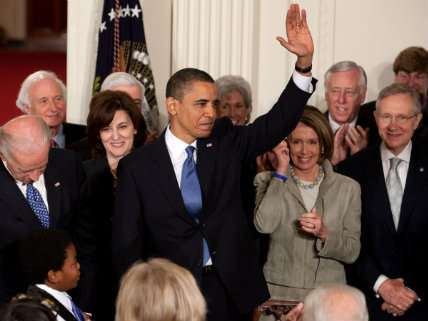Government Watchdogs Agree: Obamacare's Insurer Bailouts Aren't Authorized. The Administration Plans to Make Payments Anyway.

Covering health insurer losses through Obamacare's risk corridors provision—a program frequently described as a federal bailout of insurers—might not just be controversial. It may well be illegal.
Indeed, both the Congressional Research Service (CRS) and the Government Accountability Office (GAO) have concluded this year, that, without additional congressional authorization, the administration has no authority to make payments under the program beyond what is collected from insurers.
As J.D. Tuccille noted last week, the GAO's report was a reminder that "it's not enough for a statute to require that an agency make a payment—the funds have to be legally available."
Despite the opinions of both CRS and GAO, however, the Obama administration says it's going to go ahead with the payments anyway, congressional authorization or not.
HHS has not made any payments to insurers so far, but it plans to do so in the fiscal year that starts Oct. 1," reports Modern Healthcare. "In response to the GAO inquiry, HHS indicated that the agency already has the authority to fund the program under existing appropriations."
One defense of the administration's decision is that Medicare Part D, the prescription drug program for seniors, also relies on risk corridors, and the program's payments are made without additional congressional authorization. That's true, but the payments are made out of Medicare's Part B trust fund (which, yes, is itself a sort of accounting fiction, but does at least exist in some accountant's sense). There's no similar fund for making payments in Obamacare.
At best, it's another example of the administration implementing Obamacare in a way that is convenient and yet legally dubious—and probably illegal.


Show Comments (114)